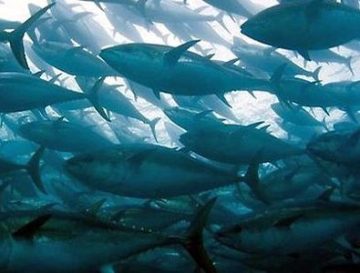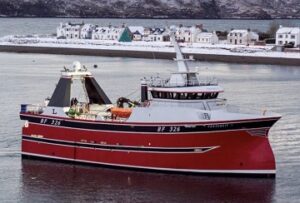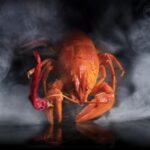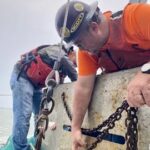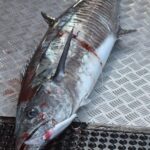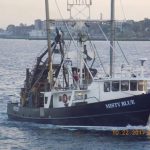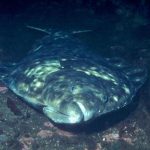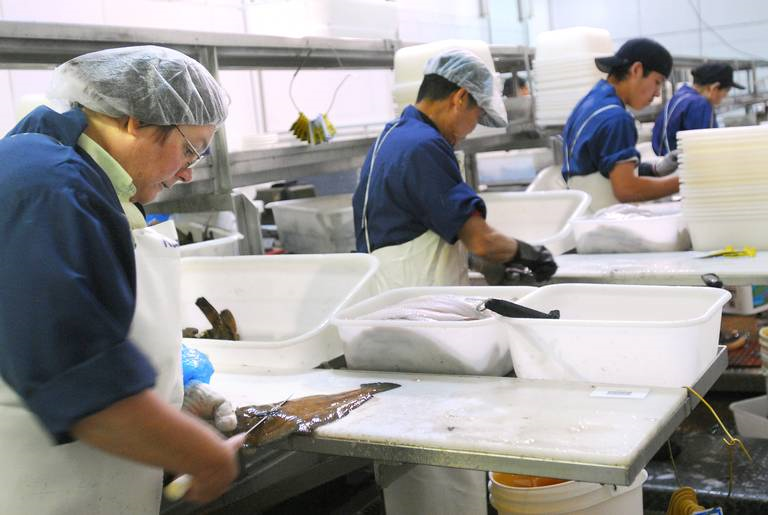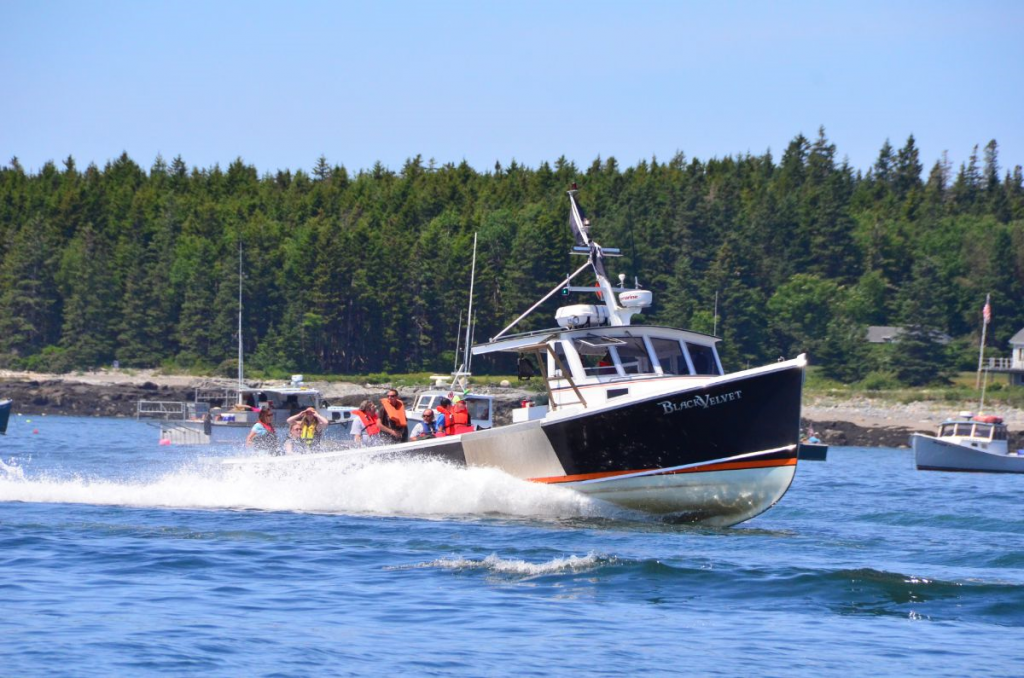Category Archives: Pacific
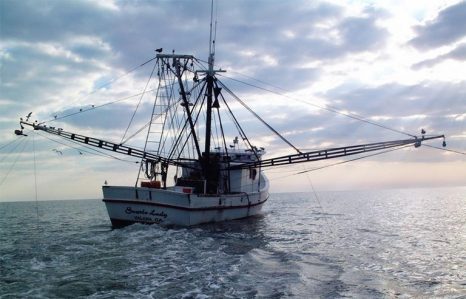
NIOSH regional reports highlight top dangers in commercial fishing industry
Vessel disasters and falls overboard are the primary hazards experienced by workers in commercial fishing – an industry with a fatality rate 29 times higher than the national average – according to a recent NIOSH analysis of four U.S. regions. NIOSH reviewed overall commercial fishing fatalities in Alaska, the Gulf of Mexico, and the East and West Coasts from 2010 to 2014. Researchers found that 184 fatalities occurred in the four regions: Alaska recorded 45, the West Coast had 30, the East Coast reported 60 and the Gulf of Mexico experienced 49. Vessel disasters (capsizes, fires, groundings, sinking) accounted for the most deaths with 80, followed by falls overboard with 53. Other categories included onboard, onshore and diving. click here to read the story 23:24
Marine feedlots and the tide against wild fish
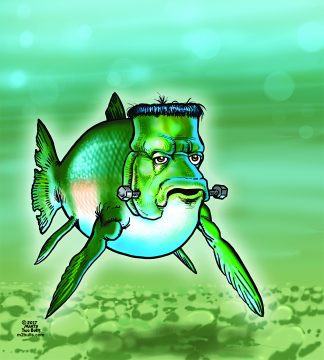 In a time of eclipse, for the People of the Salmon the moment was catastrophic. At the height of their season for the most prized of wild salmon in the Salish Sea, Lummi fishermen south of Cypress Island hauled in several flaccid, broken-mouthed farm fish, the first of thousands of Atlantic salmon that had escaped from a failed pen. They knew something was terribly wrong. Days would pass before Cooke Aquaculture, a subsidiary of the international company responsible for the pen, would stop blaming the sun and moon, and admit to the full scale of the collapse. click here to read the story
In a time of eclipse, for the People of the Salmon the moment was catastrophic. At the height of their season for the most prized of wild salmon in the Salish Sea, Lummi fishermen south of Cypress Island hauled in several flaccid, broken-mouthed farm fish, the first of thousands of Atlantic salmon that had escaped from a failed pen. They knew something was terribly wrong. Days would pass before Cooke Aquaculture, a subsidiary of the international company responsible for the pen, would stop blaming the sun and moon, and admit to the full scale of the collapse. click here to read the story
First Nations, environmentalists occupy salmon farm in British Columbia – A group of First Nations and environmentalists are occupying a salmon farm near Alert Bay, B.C., and say they won’t leave until the provincial and federal governments revoke permits for the facility. click here to read the story 10:43
Federal Judge Evokes Dr. Seuss in Upholding Seafood Regulations
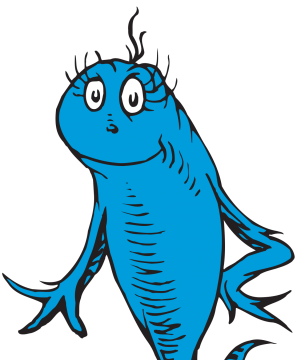 Invoking Dr. Seuss, a federal judge on Monday quoted from the 1960 classic “One Fish Two Fish Red Fish Blue Fish” to uphold a regulatory regime intended to cut down on seafood fraud and protect U.S. fishers from unfair competition. Despite a challenge to the rule by a slew of U.S. seafood importers, harvesters and processors, U.S. District Judge Amit Mehta found that the traceability rule, which requires importers to document the supply chain of imports from their origin to their arrival in the U.S., was lawfully implemented by the National Marine Fisheries Service. click here to read the story 18:32
Invoking Dr. Seuss, a federal judge on Monday quoted from the 1960 classic “One Fish Two Fish Red Fish Blue Fish” to uphold a regulatory regime intended to cut down on seafood fraud and protect U.S. fishers from unfair competition. Despite a challenge to the rule by a slew of U.S. seafood importers, harvesters and processors, U.S. District Judge Amit Mehta found that the traceability rule, which requires importers to document the supply chain of imports from their origin to their arrival in the U.S., was lawfully implemented by the National Marine Fisheries Service. click here to read the story 18:32
Bycatch Reduction Engineering Program – 2017 Awards
 NOAA Fisheries has awarded more than $2.3 million to partners around the country to support innovative bycatch reduction research projects through its . Bycatch of various species–fish, marine mammals, or turtles–can have significant biological, economic, and social impacts. Preventing and reducing bycatch is a shared goal of fisheries managers, the fishing industry, and the environmental community. click here to read the notice 14:10
NOAA Fisheries has awarded more than $2.3 million to partners around the country to support innovative bycatch reduction research projects through its . Bycatch of various species–fish, marine mammals, or turtles–can have significant biological, economic, and social impacts. Preventing and reducing bycatch is a shared goal of fisheries managers, the fishing industry, and the environmental community. click here to read the notice 14:10
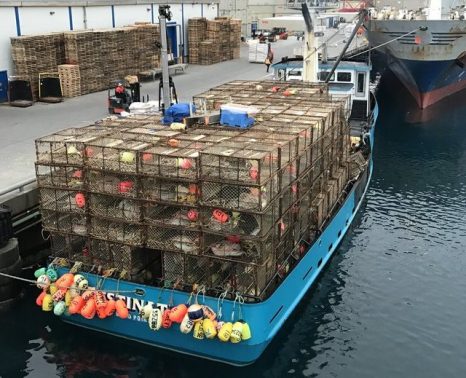
Coast Guard Marine Board of Investigation – Icy spray, heavy pots may have doomed Seattle crab boat F/V Destination
What caused the February sinking of the Seattle-based Destination in the Bering Sea? On the morning of Feb. 11, crab-boat skipper Daher Jorge received a Coast Guard radio request to assist a Bering Sea search for a missing vessel — the Seattle-based Destination. But Jorge’s own boat, the Polar Sea, was burdened by a thickening mantle of ice that made it more vulnerable to sinking. His crew had been unable to break off all that ice while at sea, so Jorge felt compelled to reject the call for assistance and head to port in Alaska’s Pribilof Islands. “That was the only reason we did not go. For our own safety,” Jorge testified during two weeks of hearings held earlier this month in Seattle by a Coast Guard Marine Board of Investigation into the sinking of the Destination and loss of all six of its crew. click here to read the story 12:44
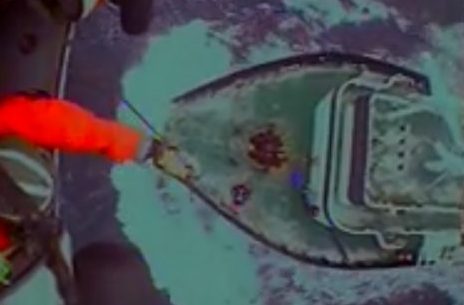
Coast Guard medevacs man from fishing vessel near Cold Bay, Alaska
A Coast Guard Air Station Kodiak MH-60 Jayhawk helicopter crew medevaced a crewman from the fishing vessel Unimak, a 183-foot fishing trawler, near Cold Bay, Alaska, Friday. The Jayhawk crew safely hoisted the ill crewman from the Unimak, which was 46 miles northwest of Cold Bay, at 8:52 p.m. and transported him to emergency medical personnel at the Cold Bay Clinic at approximately 9 p.m. Coast Guard District 17 Command Center watchstanders in Juneau received notification from Health Force Partners stating a Unimak crewman had symptoms of dizziness and weakness, along with general confusion. A Coast Guard flight surgeon recommended a medevac. click here to watch video 09:14
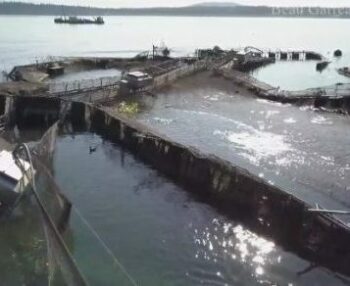
Washington State halts salmon farm permits after fish escape – Critics call for Land Based Aquaculture
Washington Gov. Jay Inslee has directed the Department of Ecology to put on hold any new permits for net pens after thousands of Atlantic salmon escaped into Puget Sound earlier this month from a damaged salmon farm. State officials also announced on Saturday the formation of a response team made up of the departments of Natural Resources, Fish and Wildlife, and Ecology. The team includes the Office of the Governor and state Emergency Management Division. It’s not yet clear how many non-native Atlantic salmon escaped into Puget Sound from Canada-based Cooke Aquaculture’s salmon farm off Cypress Island. click here to read the story 12:05
Salmon spill prompts open-net fish farm critics to tout benefits of land-based aquaculture – Critics of open-net fish farms say the escape of Atlantic salmon from a Washington state pen should convince Canada to support a transition to land-based aquaculture, used by most of the world. click here to read the story 12:09
Herrera Beutler: To save steelhead, we must cut sea lion numbers
 Steelhead, longtime residents in our rivers here in the Pacific Northwest, are now approaching extinction with alarming speed. This isn’t exaggeration; the Oregon Department of Fish and Wildlife found that one population of steelhead has an 89 percent chance of becoming extinct in the not too distant future. The culprit for the fish’s demise? Sea lions. Experts are pointing to the increased population of California sea lions as the biggest threat. The sea lions gather in locations where steelhead and salmon are the most vulnerable, like below the Willamette Falls or the Bonneville Dam, where these native fish species congregate before heading upstream to spawn. An alarmingly low number of native steelhead — just 512 — made it over Willamette Falls this year. click here to read the story 10:01
Steelhead, longtime residents in our rivers here in the Pacific Northwest, are now approaching extinction with alarming speed. This isn’t exaggeration; the Oregon Department of Fish and Wildlife found that one population of steelhead has an 89 percent chance of becoming extinct in the not too distant future. The culprit for the fish’s demise? Sea lions. Experts are pointing to the increased population of California sea lions as the biggest threat. The sea lions gather in locations where steelhead and salmon are the most vulnerable, like below the Willamette Falls or the Bonneville Dam, where these native fish species congregate before heading upstream to spawn. An alarmingly low number of native steelhead — just 512 — made it over Willamette Falls this year. click here to read the story 10:01
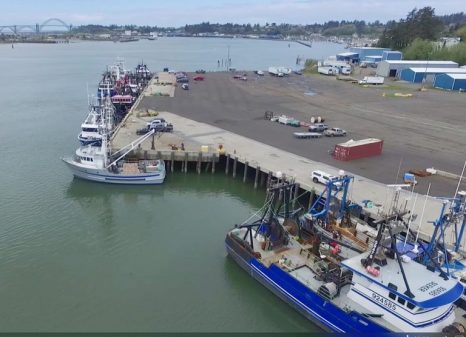
Two Newport Port Commissioners and Staff to Meet with Federal Grant Officials to Save International Terminal Project
Two Newport Port Commissioners and staff will meet Monday for a reality check with federal officials over a big grant to support the completion of the long-awaited International Terminal. The project involves the city of Newport that may be in a position to provide urban renewal bonding as well as support from the Hall family which owns waterfront property just to the east. But none of it can happen unless the Port can keep the effort on target and on time. click here to read the story 09:50
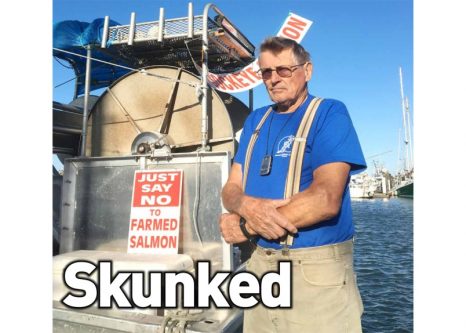
No feast during sockeye famine in Richmond
For a second year in a row, all commercial fishing of the Fraser River’s sockeye salmon has been closed by the Fraser River Panel, the regulatory body that assesses annual salmon runs. Only 1.7 million sockeye are expected to return to the Fraser this year, which is just over a third of the 4.4 million that were expected at the start of the year.,,, The closure should put a premium price on salmon for consumers, according to local fisherman Gus Jacobson. click here to read the story 18:47
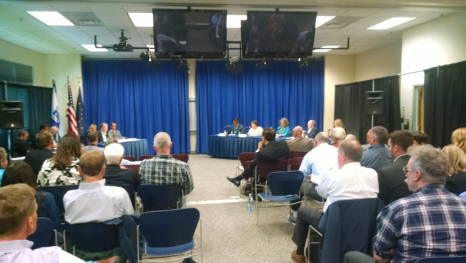
Fish pie – Everyone wants a piece
Representatives of the haves and have-nots of American ocean fisheries gathered in a packed college classroom here on Wednesday to offer Sen. Dan Sullivan, R-Alaska, their ideas on what he could do with the Magnuson-Stevens Fisheries Conservation and Management Act. The now 40-year-old federal fisheries legislation is the legacy of the late and revered Alaska Sen.Ted Stevens.,,, And there is no doubt the MSA has problems when it comes to dealing with recreational fishing. Anglers, charter-boat operators, commercial fishermen and environmental groups are at the moment all in a Gulf of Mexico scrum fighting over red snapper. It is in many ways a tussle that almost makes the long-running fish war in Cook Inlet look tame. click here to read the story 08:25
Fugitive Farmed Atlantic salmon ‘heading to every river in Puget Sound’
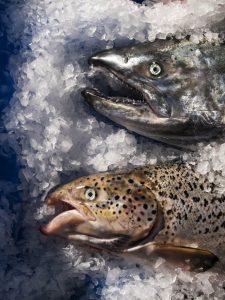 The Lummi Nation is marshaling a mop-up of thousands of fugitive Atlantic salmon in the tribe’s territorial waters, and the Swinomish chairman has called for a shutdown of the farmed-salmon industry in Puget Sound after last weekend’s spill. Swinomish fishermen caught farmed Atlantic salmon in the Skagit River on Wednesday night, as the fish continued to disperse through the Puget Sound, said Brian Cladoosby, chairman of the Swinomish Indian Tribal Community. He also received a report of an Atlantic salmon caught off Alki Point on Thursday afternoon. “These fish are headed to every river in Puget Sound,” Cladoosby said. “We have been saying all along it was not a question of if, but when, this would happen. click here to read the story 23:27
The Lummi Nation is marshaling a mop-up of thousands of fugitive Atlantic salmon in the tribe’s territorial waters, and the Swinomish chairman has called for a shutdown of the farmed-salmon industry in Puget Sound after last weekend’s spill. Swinomish fishermen caught farmed Atlantic salmon in the Skagit River on Wednesday night, as the fish continued to disperse through the Puget Sound, said Brian Cladoosby, chairman of the Swinomish Indian Tribal Community. He also received a report of an Atlantic salmon caught off Alki Point on Thursday afternoon. “These fish are headed to every river in Puget Sound,” Cladoosby said. “We have been saying all along it was not a question of if, but when, this would happen. click here to read the story 23:27

Seafood giant back in Warrenton
Mike Brown, like many in the seafood processing industry, is used to old buildings — massive complexes from another generation that have seen countless fish and hundreds of filleters come and go over the decades. But as general manager of Pacific Seafood Group’s rebuilt Warrenton facility, Brown is about to be in charge of a brand-new building. The West Coast seafood processing giant is in the middle of rebuilding after a fire destroyed the original plant in 2013. Construction began last year, click here to read the story 20:37
Interior secretary won’t eliminate any national monuments
 Interior Secretary Ryan Zinke said he’s recommending that none of 27 national monuments carved from wilderness and ocean and under review by the Trump administration be eliminated. But there would be changes to a “handful,” he said. Zinke told The Associated Press that unspecified boundary adjustments for some monuments designated over the past four decades will be included in the recommendations he planned to give President Donald Trump on Thursday. None of the sites would revert to new ownership, he said, while public access for uses such as hunting, fishing or grazing would be maintained or restored. click here to read the story 12:39
Interior Secretary Ryan Zinke said he’s recommending that none of 27 national monuments carved from wilderness and ocean and under review by the Trump administration be eliminated. But there would be changes to a “handful,” he said. Zinke told The Associated Press that unspecified boundary adjustments for some monuments designated over the past four decades will be included in the recommendations he planned to give President Donald Trump on Thursday. None of the sites would revert to new ownership, he said, while public access for uses such as hunting, fishing or grazing would be maintained or restored. click here to read the story 12:39

Structural Problems – Washington state fish farm’s collapse has reinvigorated salmon-farming debates
The Washington state fish farm that collapsed allowing many thousands of Atlantic salmon to escape into the Pacific showed signs of trouble last month, and was slated for upgrades. In late July, the Cooke Aquaculture-owned operation near Cypress Island required emergency work to stabilize the net pens after crews saw them moving in currents. Then last weekend, the same pens, containing 300,000 Atlantic salmon, began showing damage on Saturday before collapsing on Sunday, releasing an unknown number of fish. While the incident happened in Washington state, it’s reinvigorated the longstanding debate about fish farming on Canada’s West Coast, including the controversial but common practice of farming Atlantic salmon in Pacific waters. click here to read the story 08:26
Spill of farmed Atlantic salmon near San Juan Islands much bigger than first estimates – The farm held a total of more than 300,000 fish weighing some 3 million pounds. click here to read the story 11:15
‘Deadliest Catch’ tragedy: Sig Hansen in tears as crab fishermen friends are lost at sea
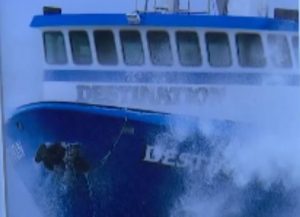 Crab fishing is a dangerous profession and that was made tragically clear on Tuesday night’s emotional episode of “Deadliest Catch.” On the Discovery Channel show, the captains were devastated to learn that the Destination, the ship of their friend Jeff Hathaway, had gone missing off the coast of Alaska. Hathaway and his crew couldn’t be found. The Bering Sea had been fierce all winter and as the episode began, veteran Sig Hansen noted, “We have had our close calls. It makes me wonder, how many chances do we get?” Sadly, unbeknownst to the skippers, the coast guard was searching for a missing vessel that had set off a distress signal. click here to read the story 09:53
Crab fishing is a dangerous profession and that was made tragically clear on Tuesday night’s emotional episode of “Deadliest Catch.” On the Discovery Channel show, the captains were devastated to learn that the Destination, the ship of their friend Jeff Hathaway, had gone missing off the coast of Alaska. Hathaway and his crew couldn’t be found. The Bering Sea had been fierce all winter and as the episode began, veteran Sig Hansen noted, “We have had our close calls. It makes me wonder, how many chances do we get?” Sadly, unbeknownst to the skippers, the coast guard was searching for a missing vessel that had set off a distress signal. click here to read the story 09:53
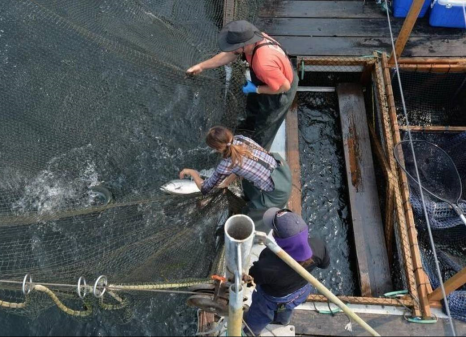
Traffic, sun blindness, now eclipse dumps 305,000 Farmed Atlantic salmon near San Juan Islands
It’s open season on (farmed) Atlantic salmon as the public is urged to help mop up a salmon spill from an imploded net holding 305,000 fish at a Cooke Aquaculture fish farm near Cypress Island. Lummi fishers out for chinook on Sunday near Samish, south of Bellingham Bay, were shocked to pull up the spotted, silvery sided Atlantic salmon — escapees that turned up in their nets again Monday. The Washington Department of Fish and Wildlife is urging the public to catch as many of the fish as possible, with no limit on size or number. The fish are about 10 pounds each. No one knows yet how many escaped. But the net had some 3 million pounds of fish in it when it imploded about 4 p.m. Saturday, said Ron Warren, fish program assistant director for the WDFW click here to read the story 15:05
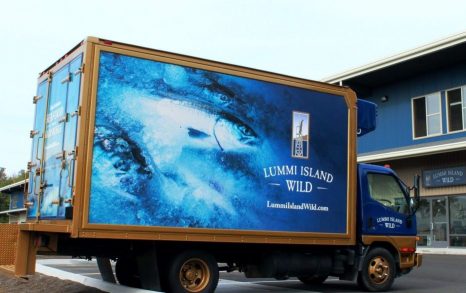
Lummi Island Wild Takes to the Streets with a Little Help from Signs Plus, Inc.
With eight of the only twelve reefnetting commercial fishing organizations in the world right here in Whatcom County, Lummi Island Wild is among the unique and truly sustainable businesses that bring our local fish to our grocery stores and ultimately our dinner tables. Lummi Island Wild, a locally-owned cooperative business, takes fishing and quality very seriously. From the fishing to the processing, they are part of every step – ensuring the highest quality of their products.,, Reefnetting, a historic Pacific Northwest fishing method, involves a spotter who calls to have the nets raised when he sees a school of salmon in place. The salmon are then rolled over the platform and into holding tanks full of seawater where they are allowed to rest. At that point, any unwanted bycatch is released unharmed back into the sea. “We do it differently and we do it better,” says Keith Carpenter, President and Executive Director of Lummi Island Wild. “We are committed to making things better.” click here to read the story 09:50
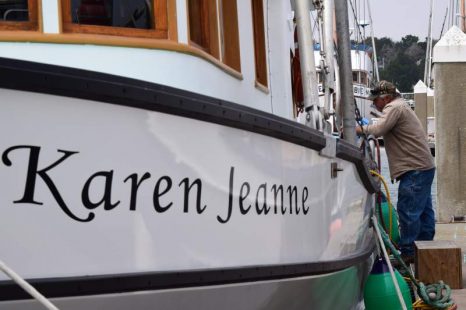
Drought years cut North Coast salmon population
Soon after the commercial salmon season opened on Aug. 1, Chris Lawson steered his 53-foot boat named Seaward out of the marina at Bodega Bay into ocean waters where he figured chinook salmon would travel. He spent the day trolling, his lines carefully prepared to entice the spirited, iridescent fish. There were plenty of salmon, but mostly two-year-olds too small for a commercial fisherman to keep. Lawson shook off nearly 100 short fish from his lines and kept just seven longer than the minimum size — 27 inches. He snagged $9 a pound for 63 pounds, yielding $567 for the day’s work before fuel expenses and pay to one crew member, who gets 20 percent.,, “Seven hours, we had seven fish,” Lawson said. “You make a little bit of money. There were a lot of short fish,” said Lawson, interviewed alongside his boat on Aug. 10. “It looks better for next year. Recreational guys are having an OK season.” Their size limit is smaller. click here to read the story 14:43
Congress Picks Sides on Trump Plan to Expand Offshore Drilling
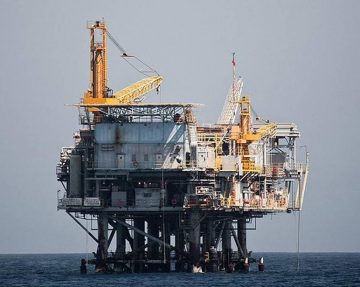 President Donald Trump’s plan to expand offshore oil drilling spurred dueling letters from members of Congress last week, 118 of whom say the plan is critical for U.S. energy security, while 69 others doubt it — plus nearly 18,000 letters of public comment, most of them opposing expanded drilling. Only 6 percent of the U.S. Outer Continental Shelf is available for leasing to oil and gas drillers from 2017 to 2022, under a drilling plan completed in the final days of President Barack Obama’s presidency. The shelf is 1.7 billion acres of submerged federal land from 3 nautical miles off the coastline, state-regulated waters, to 200 nautical miles out. click here to read the story 11:06
President Donald Trump’s plan to expand offshore oil drilling spurred dueling letters from members of Congress last week, 118 of whom say the plan is critical for U.S. energy security, while 69 others doubt it — plus nearly 18,000 letters of public comment, most of them opposing expanded drilling. Only 6 percent of the U.S. Outer Continental Shelf is available for leasing to oil and gas drillers from 2017 to 2022, under a drilling plan completed in the final days of President Barack Obama’s presidency. The shelf is 1.7 billion acres of submerged federal land from 3 nautical miles off the coastline, state-regulated waters, to 200 nautical miles out. click here to read the story 11:06
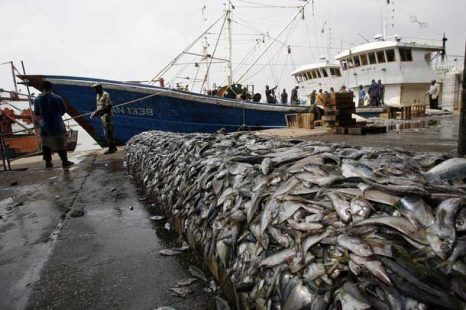
Fish Stocks And Our Balance Of Payments
Our balance of payments is overly burdened by our consumption of seafood: We import approximately 90% of the seafood that we eat. Given our natural resources, we should be net exporters of seafood. The total value of edible and non-edible fishery imports in the United States was $35.8 billion in 2016. The total value of edible and non-edible exports was $21.3 billion. The imbalance does not imply only a shipment of dollars abroad. It also implies a number of jobs exported, a number of jobs that could be created in this country, were we not to import that much more seafood than we export.,,, The reason for the imbalance in our accounts with other nations is not due to lack of fish in our waters. Not to put too fine a point on it, the imbalance is due to rules and regulations imposed by our National Marine Fisheries Service (NMFS) that prevent our fishermen from catching fish. click here to read the article by Carmine Gorga 09:21
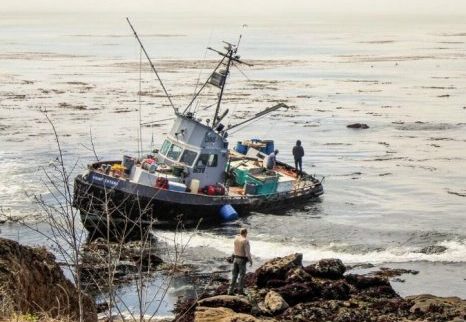
Coast Guard issues order requiring approved salvage plan for grounded fishing vessel in Estero Bluffs State Park
The Coast Guard directed the owner of the commercial fishing vessel, Point Estero, to submit a salvage plan before making any arrangements to refloat the grounded vessel near Estero Bluffs State Park Thursday evening. The Coast Guard Sector Los Angeles-Long Beach commander, Capt. Charlene Downey, instructed the owner to submit a plan detailing actions to be taken by the owner to make the vessel seaworthy for safe transit to a facility to affect permanent repairs for approval by a local Coast Guard representative. After the Point Estero grounded July 28, the Coast Guard removed approximately 91 gallons of oil, 2.5 cubic yards of contaminated material and two marine-grade batteries to prevent pollution. -USCG-

Developing … Peter Pan Seafoods Port Moller plant devastated in overnight fire
The Peter Pan Seafoods processing plant in Port Moller has been devastated by a massive fire that burned through the night and into Wednesday morning. So far no one has been reported injured, but power, running water, and most phone and internet connections are down in remote community. “The fire started kind of in the production end of things, kind of the freezing warehouse at Peter Pan Seafoods last night. And consumed most of the production facilities that we can tell,” said Bob Murphy, the ADF&G area management biologist based in Port Moller. Murphy was reached a little before 8 a.m. Wednesday. A fisherman who watched the fire from his vessel reported that he saw flames shooting 150 feet high, and that the long dock was eventually cut away to contain the fire. click here to read the story 15:21
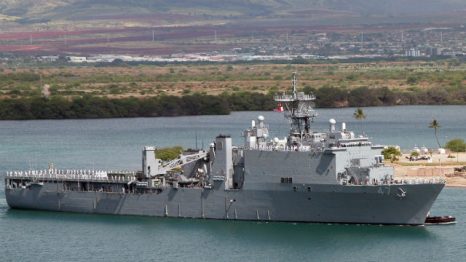
San Diego-Based USS Rushmore Departs on Fisheries Enforcement Mission
The San Diego-based amphibious dock landing ship USS Rushmore was steaming toward the South Pacific Tuesday to provide enforcement of fisheries around 10 island nations, according to the Navy.,, “Our crew is very excited to take part in the OMSI mission,” said Cmdr. John Ryan, commanding officer of Rushmore. “Working in tandem with the U.S. Coast Guard is a new experience for us, which will continue to demonstrate how the extensive range of U.S. Navy assets provides critical support to the embarked boarding teams in their mission of enforcing fishery laws.” click here to read the story 08:28
Seafood supplier sues over lobster heist
 Seafood importer and supplier Maxfield Seafood sued Seneca Logistics over a major seafood theft from its warehouse in Boston, Massachusetts. In the complaint filed in federal court in Massachusetts, Maxfield – which is based out of City of Industry, California – claimed that Seneca was negligent when a truckload of lobster worth USD 318,000 (EUR 271,762) was stolen. In mid-December 2016, Maxfield called Seneca to request transportation of a truckload of lobster which was to be picked up at two locations in Massachusetts, including one in Everett, according to the complaint. click here to read the story 16:45
Seafood importer and supplier Maxfield Seafood sued Seneca Logistics over a major seafood theft from its warehouse in Boston, Massachusetts. In the complaint filed in federal court in Massachusetts, Maxfield – which is based out of City of Industry, California – claimed that Seneca was negligent when a truckload of lobster worth USD 318,000 (EUR 271,762) was stolen. In mid-December 2016, Maxfield called Seneca to request transportation of a truckload of lobster which was to be picked up at two locations in Massachusetts, including one in Everett, according to the complaint. click here to read the story 16:45
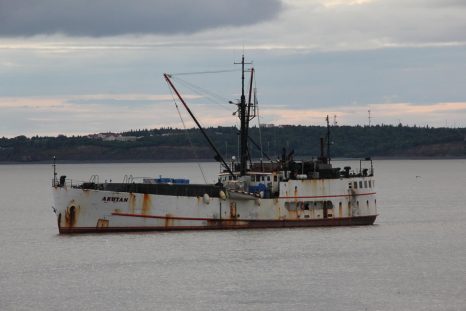
The F/V Akutan’s sad, failed season in Bristol Bay
Fiasco. Disaster. Nightmare. These are words used by those involved with the floating processor Akutan to describe a fishing season gone terribly wrong. The Akutan, owned by Klawock Oceanside, Inc., was supposed to custom process up to 100,000 pounds of Bristol Bay salmon a day for a small fleet of fishermen under the banner Bristol Bay Seafoods, LLC. After July 25, it was bound for the Kuskokwim to give local fishermen their only salmon market.,,, “We’re in peril,” Captain Steve Lecklitner said Saturday. “We know we cannot stay in this river. It’s breaking down our systems. The owners have basically abandoned the vessel. The mortgage holders and the lenders have not established contact. I’m trying to get parts for our generator, and as soon as that’s done, it’s our intention to move the vessel to Dutch Harbor.” click here to read the story 08:16
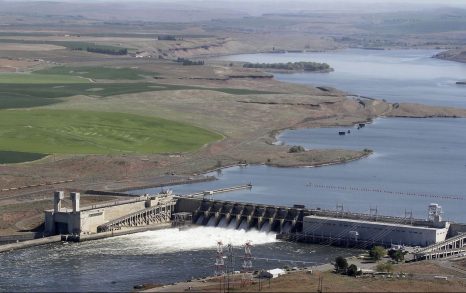
Trump administration urged to avoid salmon protection rules
A group that represents farmers is calling the costs of saving imperiled salmon in the largest river system in the Pacific Northwest unsustainable and is turning to the Trump administration to sidestep endangered species laws. The Columbia-Snake River Irrigators Association wants the government to convene a Cabinet-level committee with the power to allow exemptions to the Endangered Species Act. The irrigators association is frustrated with court rulings it says favor fish over people, claiming the committee could end years of legal challenges over U.S. dams on the Columbia and Snake rivers and bring stability for irrigators, power generators and other businesses that rely on the water. click here to read the story 18:12
Trump Admin Won’t List Non-Endangered Tuna As An Endangered Species
The Trump administration declined a petition to list the Pacific bluefin tuna as “endangered” Tuesday after the Department of Commerce (DOC) found that the fish was not facing any significant threat of extinction. A petition from the Center of Biological Diversity to list the fish under the Endangered Species Act (ESA) triggered the Commerce Department’s review. The review began under former President Barack Obama, and lasted for 12 months before the DOC’s National Marine Fisheries Service (NMFS) issued its findings, according to the notice published in the Federal Register. The Center for Biological Diversity claimed the tuna was at risk of extinction, based on findings by the International Union for Conservation of Nature (IUCN). click here to read the story 20:01








